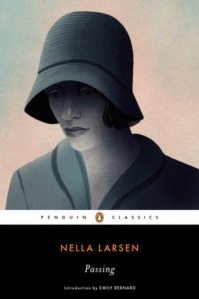Synopsis
“Clare Kendry is living on the edge. Light-skinned, elegant, and ambitious, she is married to a racist white man unaware of her African American heritage, and has severed all ties to her past after deciding to “pass” as a white woman. Clare’s childhood friend, Irene Redfield, just as light-skinned, has chosen to remain within the African American community, and is simultaneously allured and repelled by Clare’s risky decision to engage in racial masquerade for personal and societal gain. After frequenting African American-centric gatherings together in Harlem, Clare’s interest in Irene turns into a homoerotic longing for Irene’s black identity that she abandoned and can never embrace again, and she is forced to grapple with her decision to pass for white in a way that is both tragic and telling.”
Review

Passing by Nella Larsen was my pick for this month’s Rory Gilmore Book Club the prompt of which was the read a book by a woman author. It also gave me a chance to check a book off my Classics Club reading list.
Prior to joining the Rory Gilmore Book Club, I was unfamiliar with Nella Larsen. Once I read the synopsis for Passing I was very intrigued as this is a subject I knew little about. The story begins with Irene Redfield who has a chance encounter with her childhood friend, Clare Kendry. Both being light-skinned, Irene is astonished to find that Clare has been passing as a white woman for years. On top of that, Clare is married to a man named John Bellew who is white and also racist.
The story unfolds in three parts as Irene must grapple with her old friend’s new lifestyle. Irene at first resists but then ultimately allows Clare to come back into her life. In between their renewed friendship Irene finds it difficult to escape her feelings of horror at the racism displayed by Clare’s husband. Irene cannot fathom how Clare can stand to live with this man.
Still, Irene goes back and forth between feeling repelled by Clare’s choices and also wanting to be there for her friend. On the whole, she cannot seem to shake Clare loose and Clare soon becomes part of Irene’s life. For Clare’s part, her desire to spend so much time with Irene is due to a desire to reconnect with her African American heritage which she does not have the ability to do in the new life she has chosen for herself.
“It’s funny about ‘passing.’ We disapprove of it and at the same time condone it. It excites our contempt and yet we rather admire it. We shy away from it with an odd kind of revulsion, but we protect it.”
Irene Redfield, from Passing by Nella Larsen
At various social gatherings Irene is on the edge of her seat with the belief that Clare’s true identity will be exposed. From her perspective, Clare is on a very thin line with maintaining her new identity and Irene seems to want her to be exposed. Irene and Clare are deeply jealous of one another, for their identities and their personal lives. There is palpable tension on every page as the women interact with one another and reflect afterwards.
On the opposite end of the spectrum, Clare is outwardly affectionate to everyone she comes into contact with and experiences none of the distress that plagues Irene. Still, my heart went out to her because of the situation she found herself in which though it benefited her personally at the time, seems to have now spiraled out of her control. Clare is not a distressed character that the reader is expected to feel sorry for, but I did. I won’t reveal too much about the ending but I was on the edge of my seat while reading what ultimately becomes a tragic ending that affects every single character.
The copy of Passing that I checked out at the library contained a notes section which included explanations and examples of different words, phrases, and current events that were mentioned in the story. One that prompted me to do an internet search of my own was the mention of Rhinelander v. Rhinelander, which was a divorce case in 1925 in which the husband sued the wife on the grounds that the wife hid her racial identity from her husband. The mention of this court case in Passing is a good example of how prominent this topic was in the 1920s, a time when interracial marriage was extremely rare.
Passing reads like psychological fiction with elements of historical fiction while maintaining the elegance of classic literature, all in less than 200 pages. I’m so glad I had the chance to read Passing for these two reading challenges and I would recommend it to anyone, especially those looking for a classic novel that is on the shorter side.
It’s a great read, isn’t it. Brit Bennet’s “The Vanishing Half” is a modern riff on the topic which might pique your curiosity.
LikeLiked by 1 person
Ive heard of “The Vanishing Half” but had no idea it was about a similar topic, thanks for the recommendation!
LikeLike